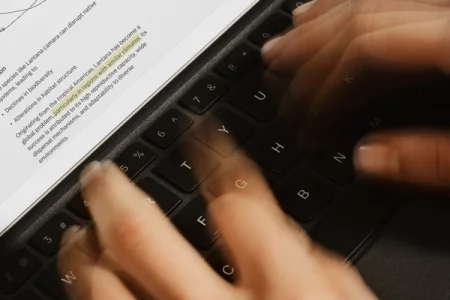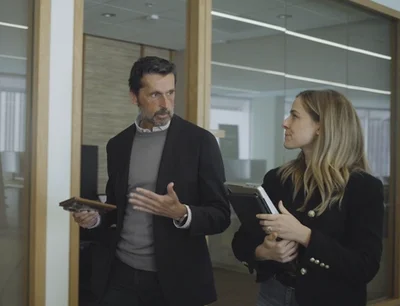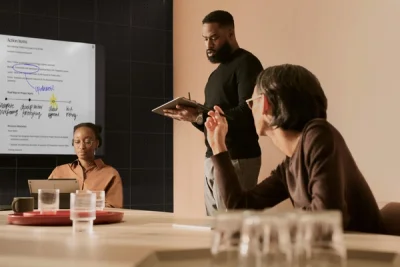The 2024 reMarkable knowledge worker survey
We explored the state of mind of people whose success hinges on their ability to focus, process information, and think critically. The conclusion: our brains have never been busier.

Nearly half of us feel distracted at work. Unnecessary meetings and jam-packed calendars prevent us from focusing. And the young adults entering the workforce today are more stressed and anxious than anyone who came before them.
These are only some of the headline findings in the inaugural reMarkable knowledge worker survey, conducted in collaboration with global consumer research company GWI. Together, we surveyed more than 2,000 knowledge workers — people whose success at work hinges on their ability to focus, process information, and think critically.
We wanted to know: What’s the state of mind of the modern knowledge worker? What’s keeping us from deep, uninterrupted thinking? And what can we do to reverse the trend?
“Our research confirms what we all feel: our brains have never been busier,” said Phil Hess, CEO of reMarkable. “But there’s good news, too. So many of us value deep, uninterrupted thinking. We know it can improve our productivity, quality of work, decision-making, stress levels, and work-life balance. And we want to take back our ability to focus.”
We partnered with a team of neuroscientists to research how technology affects our attention. Watch our documentary to see what we found.
A deluge of distractions
Here’s a scenario that may sound familiar: You’re reading a report and summarizing its findings in a memo. Two pages in, you get an email with a meeting invitation. You glance at your calendar, wondering how you’ll rearrange your agenda so you can attend. You make an attempt, but end up adding the task to your growing to-do list. Returning the report, you go, “Where was I?”
This is an example of how a distraction can derail our train of thought at work. It could be an unnecessary meeting, a noisy office space, a text message — anything that diverts our attention from one task to another.
Our research suggests there’s not one thing to blame for distractions at work. Common culprits include:
- Excessive workload (38%)
- Unnecessary meetings (36%)
- Workspace distractions (36%)
- Communication tools (33%)
- Psychological distress (33%)
Once we’ve dismissed the distraction, it takes us an average of 15 minutes to refocus on what we were working on originally. The result is that our workday can become a series of cognitive shifts, as we spread our mental capacity too thin to give any one task our full attention.
Gen Z and ‘technostress’
Across all ages, people are struggling to do what was once second nature — read a book, engage in deep reflection, or simply be present in the moment. Our brains are wired to seek and expect endless interruptions, deterring our capacity for critical thinking and meaningful connections.
Generation Z, which is now entering the global workforce, is often seen as hyperconnected. But being the first to grow up with smartphones in their hands comes at a significant cost.
Gen Z is the hardest hit by “technostress” — the sensation of being overwhelmed by new technology. In our study, four of five Gen Zers say they feel stressed at work, compared to about half of baby boomers.

Work-life imbalance
The differences between generations extend beyond the office.
Baby boomers are more likely to have a clearly defined work-life balance. For younger knowledge workers, technology is blurring this line. Answering work messages when they’re off the clock is the norm, not the exception, which may be why more than one-third of Gen Zers feel work-related stress negatively affects their private lives in the following ways:
- Sleep disturbances (25%)
- Brain fog (23%)
- Inability to focus and concentrate (21%)
- Reduced attention span (17%)
- Emotional imbalance (17%)
If you’ve ever checked your phone when you should be trying to fall asleep, you’re not alone. About half of the people we surveyed do the same, but among Gen Zers, the share rises to nearly 3 in 4.
Here’s to a more focused future
If reading these results has you concerned about the future of working and thinking, read on for good news.
Despite distractions, virtually everyone we surveyed sets aside at least one hour a week for tasks that require deep thinking:
- Less than 5 hours: 42 %
- 5-15 hours: 34 %
- More than 15 hours: 24 %
The reason is simple: It brings us satisfaction and joy. When we dedicate our mental capacity to a single task, we feel more productive, less stressed, and capable of producing higher-quality work.
Our research also found that we don’t just see the benefits of focused work — we want more of it. In fact, more than 60% of those we surveyed say the ability to focus and think deeply will become more important in the future. Just as many feel that having more time for uninterrupted thinking would have a positive impact on their work.
And we’re already taking steps to do so. We’re reducing digital distractions during work hours. We take handwritten notes when we need to do our best thinking.
“The ability to focus isn’t just a skill — it’s a superpower,” said Phil Hess, CEO of reMarkable. “We need better technology — calm technology — to nurture that superpower. Focus, nurtured by calm, intuitive technologies, empowers workers to unlock their cognitive potential and perform at their best.”
About the reMarkable knowledge worker survey
If you think for a living, you’re a knowledge worker. But how do you and your colleagues approach the process of thinking itself? What habits fuel your productivity, what obstacles hinder your focus, and what aspirations drive you to excel?
To uncover these answers, we conducted a survey in collaboration with the global consumer research company GWI in June 2024. The results provide a glimpse into the minds of 2,000 knowledge workers in the US and UK.


